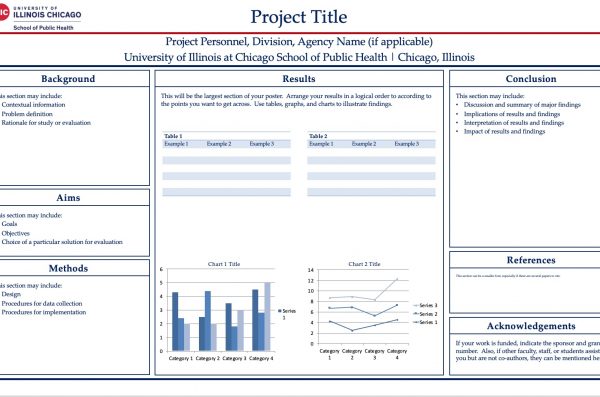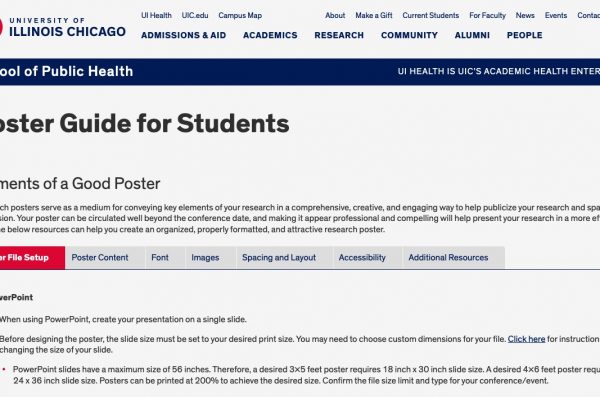Poster Competition Information
Welcome to the UIC SPH Research and Scholarship Week Poster Competition!
We look forward to gathering virtually with students, faculty, alumni, and community partners to celebrate the efforts of students across multiple disciplines and backgrounds at UIC.
Application Process Heading link
Learn about the competitions Heading link
Competition Rules
- What are the eligibility requirements for participating in the SPH Poster Competition? Students are eligible to compete in the core competition if they meet either of the following requirements:
- Currently enrolled in an undergraduate degree program or minor within the School of Public Health; OR
- Currently enrolled as a degree-seeking student in the School of Public Health (Master’s or Doctoral); OR
- Currently enrolled as a UIC degree-seeking student (Undergraduate, Master’s, or Doctoral) AND conducted research or scholarship work in a SPH unit (e.g. IHRP, Collaboratory for Health Justice)
- Students should indicate interest in participating in the virtual poster competition by completing a Letter of Intent (LOI) form by 11:59PM CST of the Step 1 deadline. (Please note: only one LOI is required per poster submission)
- Once students complete an LOI, they are welcome to begin submitting their posters and abstracts online through the poster and abstract submission form until 11:59PM CST of the Step 2 deadline.
- The SPH poster template is not a required format. Students are encouraged to edit and optimize the template provided or use a different poster template that best fits the content they will be presenting. For tips and tricks on how to create a good poster, visit the SPH poster guide webpage here.
- Students may enter any of the following confirmed competitions listed below.
- A link to all posters entered in the competition will be published on the SPH website. Presenters should plan to monitor their posters and respond to questions from judges during Research and Scholarship Week.
- Poster awards are expected to be announced by email and on the website when the event concludes.
Please feel free to contact us at sph-research@uic.edu prior to the deadline if you encounter problems with the form or have other questions.
About the competition
Students are eligible to compete in the core competition if they meet one of the following requirements:
- Currently enrolled in an undergraduate degree program or minor within the School of Public Health; OR
- Currently enrolled as a degree-seeking student in the School of Public Health (Master’s or Doctoral); OR
- Currently enrolled as a UIC degree-seeking student (Undergraduate, Master’s, or Doctoral) AND conducted research or scholarship work in a SPH unit (e.g. IHRP, Collaboratory for Health Justice)
Selecting a competition track:
- Public Health Research: research carried out in Schools of Public Health often primarily contributes to the general knowledge about a public health issue or concern. This knowledge then helps inform future efforts to address these issues or concerns.
- Scholarly Public Health Practice: the primary aim in scholarly public health practice is to directly help solve a public health problem as a collaborator or intervener.
Guidance for selecting a competition track: There is not always a clear distinction between scholarly public health practice and research. Both are scholarly and rigorous (for example, methods for collecting and analyzing data or other information are described in detail, conclusions are based on evidence and appropriately qualified, etc.). To reiterate, scholarly public health practice usually will involve a primary focus on addressing a specific public health problem or practical need that has been identified as important by a particular partner organization or group in the community, whereas research will tend to involve a focus on contributing to general knowledge about a public health issue (e.g., hypothesis testing).
Awards will be given to each of the top posters in the Master’s Scholarly Public Health Practice, Master’s Public Health Research, Doctoral Scholarly Public Health Practice, and Doctoral Public Health Research categories. Each of the Master’s and Doctoral competitions will also have an honorable mention.
Two awards will be given at the undergraduate level. Please note that the undergraduate core competition may have specific criteria in addition to the core evaluation criteria.
About the competitions
- Global Health Competition Award: Sponsored by the Global Health Program at the UIC School of Public Health, $300 will be awarded to one Master’s student and one Doctoral student who presents the highest scoring poster on a global health topic.
Eligibility: Open to SPH Master’s or Doctoral level students.
- Maternal and Child Health Competition Award: Sponsored by the Maternal and Child Health Program, $250 will be awarded to one student who presents the highest scoring poster on a maternal and child health topic.
Eligibility: Open to students enrolled in the SPH Maternal and Child Health program (MCHP) or the SPH Maternal and Child Health Epidemiology program.
- Policy, Practice, Systems and Environmental Change-Oriented Research Award: Sponsored by the Policy, Practice and Prevention Research Center (P3RC) at the UIC School of Public Health, $300 will be awarded to one Master’s student and one Doctoral student who presents the highest scoring poster on a policy, practice, systems, or environmental-change oriented research topic.
Eligibility: Open to SPH Master’s and Doctoral level students.
- Community Engaged Research Award: Sponsored by the Collaboratory for Health Justice (CHJ), these $250 awards are to be given to one Master’s level and one Doctoral level student in the School of Public Health. This award acknowledges notable research conducted in collaboration with community members to advance the priorities of a community group or community-based organization.
Eligibility: Open to SPH Master’s or Doctoral students. Posters considered for the Community Engaged Research Award must be notable in at least one of the following ways:- Assets of the community are leveraged and / or enhanced by the research.
- Community members are a crucial part of the research team or process (i.e., uses CBPR or PAR methods).
- Research was designed or applied in order to change institutional or local policy or systems to address communities’ identified needs.
About the awards
| Competition | Categories | Number of Awards | Prize |
|---|---|---|---|
| Public Health Research | Top poster: Master's, Doctoral | 2 | $300 |
| Scholarly Public Health Practice | Top poster: Master's, Doctoral | 2 | $300 |
| Undergraduate Competition | 2 | $300 | |
| Global Health Award | Master's, Doctoral | 2 | $300 |
| Maternal and Child Health Award | 1 | $250 | |
| Policy, Practice, Systems and Environmental Change-Oriented Research Award | Top poster: Master's, Doctoral | 2 | $300 |
| Community Engaged Research Award | Master's, Doctoral | 2 | $250 |
Core Criteria
| Overall Impact or Criterion Strength | Score | Descriptor |
|---|---|---|
| Low | 1 | Poor |
| 2 | Marginal | |
| 3 | Fair | |
| Medium | 4 | Satisfactory |
| 5 | Good | |
| 6 | Very Good | |
| High | 7 | Excellent |
| 8 | Outstanding | |
| 9 | Exceptional |
Core Evaluation Criteria
Judges use a standard evaluation form to score posters. Each element is ranked on a scale of 1-9 based on the table above. Elements include:
- Completeness: includes details on background, aims, methods, results, conclusion (or similar)
- Clarity: conveys message without ambiguity
- Background: contextual information/problem, definition/rationale for study or evaluation
- Aims: goals/objectives/choice of a particular solution for evaluation
- Methods: design/data collection procedures/implementation procedures
- Results: findings
- Conclusions: implications/interpretation/impact of results and findings
- Visual Display: summarizes project adequately, effectively, & aesthetically
Additional Evaluation Criteria
All posters will be judged using the core criteria, and posters participating in additional competitions will be scored using the appropriate elements below.
- Undergraduate Competition
- Inclusion of Undergraduate Curricular Themes. Project reflects two or more of the curricular themes below that are revisited throughout the baccalaureate curriculum:
- Health as a Moral Endeavor: Exploring the moral importance of health and healthcare considering individual and societal commitments and obligations including the fair use of limited resources.
- Health Equity: Having equitable access and the means and resources to attain one’s full life potential.
- Life Course Perspective: The cumulative evolutionary, pre-generational, pre-natal, and life events and circumstances that influence health at any one point in time.
- One Health [Human-Animal-Environment]: The inextricable relationship among animal, human, and environmental health as determined by, e.g. evolutionary biology, human behavior, and environmental phenomena.
- Cultural Relevance: The lens through which life events are experienced and interpreted and through which meaning is ascribed.
- Local/Global Impact: Appreciation for the global systems that influence the processes, dynamics, and activities of the world’s populations; health as a multi-faceted state-shaped within, e.g., biological, socio-cultural, geographic, economic, and political contexts.
- Inclusion of Undergraduate Curricular Themes. Project reflects two or more of the curricular themes below that are revisited throughout the baccalaureate curriculum:
- Global Health Competition
- Extent to which the project represents the field of global public health
- Maternal and Child Health Competition
- Research subject is relevant to the field of MCH
- Research findings add to the science/evidence base in maternal and child health
- Policy, Practice, Systems and Environmental Change-Oriented Competition
- Extent to which posters demonstrate research related to policy, practice, systems or environmental change-oriented research.
- Community Engaged Research Competition
- Must be notable in at least one of the following ways:
- Assets of the community are leveraged and/or enhanced by the research
- Community members are a crucial part of the research team or process (I.e., uses CBPR or PAR methods)
- Research was designed or applied in order to change institutional or local policy or systems to address communities’ identified needs
- Must be notable in at least one of the following ways:

